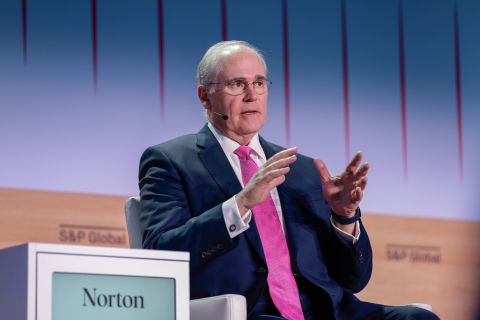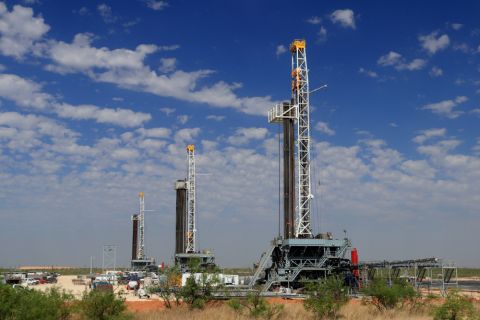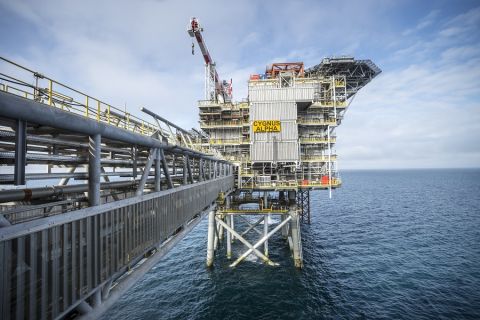Barclays, one of the biggest lenders in Europe to the fossil fuel industry, on March 30 set itself a target to reach "net zero" for its own carbon emissions and the activities it finances by 2050.
The British bank's action follows pressure from a group of investors, coordinated by campaign group ShareAction, which in January filed a resolution for the lender's shareholder meeting urging it to phase out fossil fuel lending.
While Barclays stopped short of committing to that aim, calling its net-zero target an "ambition," it said it was nevertheless committed to aligning financing activities with the goals and timelines of the Paris Agreement on climate.
As part of that, Barclays said it would provide targets to judge its progress and report on them regularly, starting in 2021, and would also continue to engage with investors as it develops the strategy.
Given that, Barclays said it expected investors to back its own resolution. The bank did not comment on whether it recommended backing ShareAction's resolution.
Investors, politicians and activists have turned their focus towards the role the banking system plays in financing fossil fuels as a way to accelerate the transition to a low-carbon economy.
Barclays is seventh in a list of lenders to the fossil fuel industry, with nearly $120 billion lent between 2016-2019, the most for any European bank, data from U.S. pressure group Rainforest Action Network showed.
"We wanted to see leadership from Barclays on this critical issue and their proposed ambition is a significant first step," said Diandra Soobiah, head of responsible investment at pension investor NEST.
NEST, which manages U.K. corporate pension scheme money, said it would support both the resolution from ShareAction and that put forward by Barclays.
"It’s important that more details follow quickly on how Barclays will deliver these ambitious climate targets, particularly their pledge to reach net-zero carbon emissions by 2050," Soobiah said.
Lankelly Chase, a charitable foundation which co-filed the ShareAction resolution, said by proposing an ambition of becoming net-zero rather than committing to it, Barclays was "asking permission to fall short of its own obligations."
"We need commitment not just ambition from a bank that only last year increased financing for oil, gas and coal companies by 2.9 billion pounds," Dominic Burke, investment director of Lankelly Chase, said.
"If a net-zero ambition does not involve phasing out fossil fuel financing, then what does it mean?"
The Local Authority Pension Fund Forum, a voluntary association of 82 public sector pension funds based in the U.K. with combined assets of approximately 300 billion pounds (US$372.03 billion), said it supported the bank's efforts.
"We are pleased to see the outcome and LAPFF has undertaken to continue to work with the company and other investors to ensure a robust plan is executed and delivered," chairman Doug McMurdo said.
Wolfgang Kuhn, ShareAction's director of finance sector strategies, said voting for both resolutions would cement Barclays new climate commitment while also insisting on the near-term ambition needed to deliver the results everyone wants.
"A climate strategy cannot be considered complete without recognizing that transition necessarily means phase-out when it comes to fossil fuels, particularly the highest carbon fuels where Barclays has significant exposure," he said.
(US$1 = 0.8064 pounds)
Recommended Reading
Enterprise Buys Assets from Occidental’s Western Midstream
2024-02-22 - Enterprise bought Western’s 20% interest in Whitethorn and Western’s 25% interest in two NGL fractionators located in Mont Belvieu, Texas.
ONEOK CEO: ‘Huge Competitive Advantage’ to Upping Permian NGL Capacity
2024-03-27 - ONEOK is getting deeper into refined products and adding new crude pipelines through an $18.8 billion acquisition of Magellan Midstream. But the Tulsa company aims to capitalize on NGL output growth with expansion projects in the Permian and Rockies.
Excelerate Energy, Qatar Sign 15-year LNG Agreement
2024-01-29 - Excelerate agreed to purchase up to 1 million tonnes per anumm of LNG in Bangladesh from QatarEnergy.
UK’s Union Jack Oil to Expand into the Permian
2024-01-29 - In addition to its three mineral royalty acquisitions in the Permian, Union Jack Oil is also looking to expand into Oklahoma via joint ventures with Reach Oil & Gas Inc.
Eni, Vår Energi Wrap Up Acquisition of Neptune Energy Assets
2024-01-31 - Neptune retains its German operations, Vår takes over the Norwegian portfolio and Eni scoops up the rest of the assets under the $4.9 billion deal.





